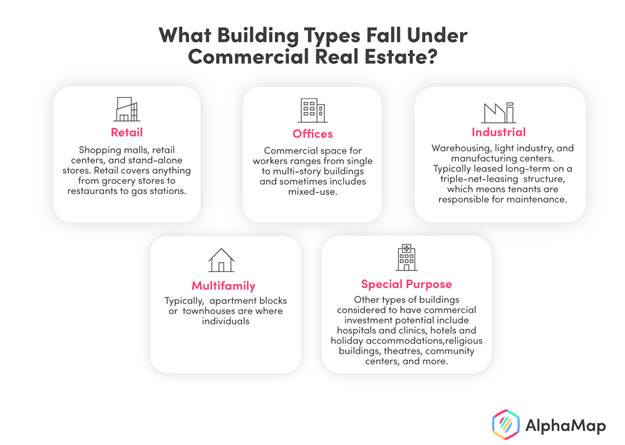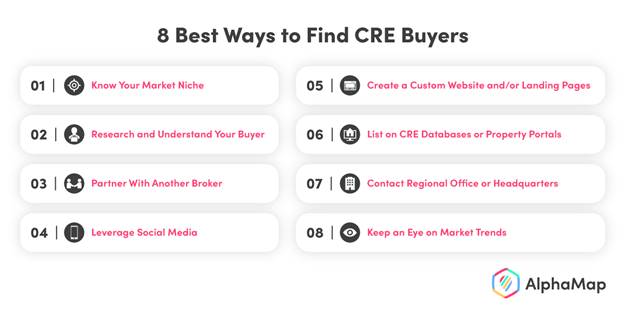How to Find Commercial Real Estate Buyers
A property is only worth as much as a buyer is willing to pay for it. But how do you find that good quality buyer who’s the perfect fit for your property and willing to pay the price you want?
There are several ways to find good buyers for commercial real estate properties, and we’ll cover a few of those in this guide. These days you can harness the power of technology to do a lot of the time-consuming lead-prospecting work for you.
Knowing who your buyers are and understanding what they are looking for is imperative. You can also use online analytics tools to research and understand the type of buyer you’re looking for.
Read on to learn about the best ways to find commercial real estate buyers.
What Building Types Fall under Commercial Real Estate?

The types of buildings that fall under Commercial Real Estate
You’ll be looking at different types of buyer profiles depending on which sector of commercial real estate you’re in. If you’re selling an industrial property, for example, it’s no good seeking out the kind of buyer that typically buys retail space. Typical retail property types include:
Retail
Shopping malls, retail centers and stand-alone stores. Retail covers anything from grocery stores to restaurants to gas stations.
Offices
Commercial space for workers ranging from single to multi-story buildings and sometimes including mixed use.
Industrial
Warehousing, light industry, and manufacturing centers. Typically leased long-term on a triple-net-leasing structure, which means tenants are responsible for maintenance.
Multifamily Units
Typically,apartment blocks or townhouses where individuals or families live.
Special Purpose
Other types of buildings considered to have commercial investment potential include hospitals and clinics, hotels and holiday accommodation, religious buildings, theatres, community centers, and more.
Who are the Main Types of Commercial Real Estate Buyers?
The objectives and expectations of each type of commercial real estate buyer are different. Generally you’ll be looking for someone who fits one of these profiles:
Investors Seeking to Expand their CRE Portfolio
Existing investors are well-versed in the ups-and-downs of buying/selling/owning commercial real estate. Investors with an existing portfolio of shopping centers might be looking to add another shopping mall to their collection.
They might also be looking to dip their toes into something new and diversify their portfolio.
Business Owners Looking to Find New or Larger Premises
Companies that are currently renting office space might have outgrown their space and decide that the most financially savvy next step is to own their own premises.
Perhaps they are selling a smaller building they own and purchasing a bigger one. They’ll have specific requirements and things like location and accessibility will be important to them.
Tenants Wanting to Own Instead of Leasing
Like the commercial business owners, other types of tenants might decide it’s time to take the plunge and purchase a property. These buyers could be industrial or retail tenants looking to invest and grow.
New Investors
Buyers looking to dip their toes into the CRE market could be looking at any or all types of real estate. They’ll likely be looking for something that is guaranteed to make them a decent profit.
Residential Real Estate Investors Wanting to Level Up Their Game
CRE investors often get into real estate investing through owning their own home first. Once they’ve had some experience of buying and selling a few residential properties, they might be keen to whet their appetite in commercial real estate.
Commercial Property Owners Conducting a Tax-deferred Exchange
A tax-deferred exchange allows a CRE investor to swap one investment property for another to defer capital gains taxes. There are certain IRS rules that must be followed in the process.
What are Commercial Real Estate Buyers Looking for?
Each category of commercial real estate buyer has unique investment objectives and expectations from the property they are purchasing. They could also have a specific set of criteria in mind, such as square footage, location, type of floor plan, and more.
Remember that not every buyer is a large corporation with a substantial portfolio. You might be dealing with an individual or a small business instead.
Get to know how they work, what they specialize in, how much they know about CRE, and where they are looking to invest before you approach them.
If you don’t know the answers to these questions, you can do a substantial amount of research using online tools beforehand. Or even ask directly.
8 Best Ways to Find CRE Buyers

The 8 best ways to find Commercial Real Estate Buyers.
You can use some of the below strategies to find buyers and generate leads for your properties:
1. Know Your Market Niche
Commercial real estate is still quite general even though it is a real estate niche in and of itself. You might have more success if you concentrate your marketing and promotion efforts on a single group of commercial real estate clients (like offices or industrial).
Instead of distributing your time and resources too thinly, you can devote more to generating particular types of high-quality leads.
To do this, you’ll need to understand trends in your specific segment of CRE. This will increase your credibility and create trust with prospective clients.
You can utilize online GIS analytics tools to research property details, market sector demographics, and analyze consumer trends. While these tools are quick and easy to use, you gain a lot of detailed knowledge which will impress your clients.
2. Research and Understand Your Buyer
Property intelligence/analytics platforms allow you to use off-market property data to gather information and understand patterns.
You can use them to research your specific buyer and understand the information that interests them when making purchasing decisions (for example rate of return).
Other online platforms also help you to identify buyers that are qualified, which reduces wasted time on a lead that’s not going to convert.
3. Partner With Another Broker
Expand your access to buyer databases. Selling commercial real estate successfully depends as much on your network as it does on your knowledge. A fantastic strategy to swiftly attract new clients is to collaborate with another broker.
For brokers who are new to the industry or attempting to break into a new niche, using the reputation of an experienced broker can be particularly helpful.
4. Leverage Social Media
Social networking is an unquestionably effective tool to expose your name, business, and area of expertise to your ideal client demographic.
It’s free and simple, and it enables you to advertise your listings, highlight client successes, and provide insightful advice for expanding enterprises that appeal to your target markets.
You can leverage your visibility on these platforms by paying for advertising when needed.
Social media can also be a useful place to do ideal client research. You can ask your followers or run surveys to eke out what they might be looking for.
5. Create a Custom Website and/or Landing Pages
Your own website with specific landing pages can generate more real estate leads via online sources (and your leads are increasingly relying on online platforms to do their searches).
You can design unique landing pages for your real estate niche or particular properties as part of targeted marketing campaigns that clearly demonstrate your experience.
6. List on CRE Databases or Property Portals
Why create a website from scratch when you don’t have to? The easiest strategy to locate a buyer for commercial real estate may be to sell the property on a commercial real estate marketplace or property portal.
Qualified agents can upload their contact details, expertise, and resumes to the databases of both listing services and professional associations. This is a simple approach to reach the millions of potential customers that use these marketplaces to purchase, sell, or lease properties.
Make the most of your real estate bio on your profile by giving the details that your potential leads are looking for.
Although it’s still critical to specialize and network for leads, by using a CRE database you can focus on your knowledge, accomplishments, and strengths that will best serve business clients.
7. Contact Regional Office or Headquarters
Sometimes an effective way to connect with potential leads is to contact them directly. Once you’ve finished your market research and you have a clear idea of the type of buyer you are looking for, it’s easy to start finding real companies that fit the profile.
Pick up the phone and find out if they’re currently looking. People shy away from the idea of cold calling, but it can be incredibly effective for finding qualified leads.
8. Keep an Eye on Market Trends
It probably goes without saying that real estate market cycles affect the types of commercial real estate that buyers are looking for at any one time. For example, industrial properties have shown a boom post the 2020 pandemic.
As a broker, you’ll need to keep a watchful eye on changes in your specific sector. This will keep you one step ahead of your competitors in terms of identifying ideal buyers at the right time.
Final Thoughts on Finding CRE Buyers
In summary, finding ideal buyers should follow a two-step process:
- Defining your ideal buyer and market – use online analytics tools to do your customer research and find property data. Do not proceed to step two until you have done this.
- Positioning yourself in the right place to be found – use both organic and paid networking methods, buy lead data, cold-calling, utilize online marketing tools, create and nurture leads with a CRM, and other strategies to generate leads.
To maximize your efforts and generate the most results, you should use several lead generation strategies at once.
Brokers that take the time to do step one properly and in-depth are more likely to find the best buyers.
Read more from AlphaMap here.
